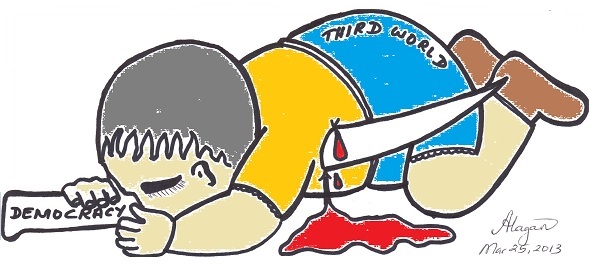– Elavalagan, March 3, 2014 –
Britain exiting from the European Union, or the Brexit, has reached the point of total chaos. In 1995, Canada faced a similar chaos after a referendum to separate Quebec from Canada was staged by the provincial separatist party. If you wonder why these democratically elected mandates drag the participants and others into chaos, the answer is: improper use of democracy!
.
In some cases, the available choices in an election are equally weighted. Two or more candidates competing for a member of parliament position is a good example of this. Electing one of the candidates and placing the winner as the Member of Parliament would cost – financially, economically, and functionally – almost an equal amount. This is because these candidates – or the available options – in the election are equally weighted. Therefore the candidate who won the highest number of votes can be the winner.
.
But there are cases where choices are not equally weighted. Electing one of those unequally weighted choices should be achieved using weighted democracy. The passing rate for the winning choice should reflect the weight of the choice.
.
Since talking about Quebec referendum or Brexit may induce some bias, let us consider an example that has less tendency to bias.
.
Let’s say your country is currently driving on the right-side of the street. And the countries around your country are driving on the left-side of the street. To make cross-border driving easier, your country may want to switch to left-hand driving also. If this matter goes to a referendum in your country, a simple victory or even a 50%+1 support for the change should NOT be enough. It is because continually keeping the old right-hand driving system will cost very little or nothing. But switching to left-side driving would cost a very large investment, cause extensive interruption to livelihoods and commerce etc. Here, it is clear that one choice has massive additional cost than the other in terms of implementation.
.
In this case, moving to drive on the left should have won a much higher percentage of support than being the first choice or having 50%+1 support. The threshold rate for the change to be elected should be defined by using a weighted formula. That formula should consider the additional cost one has over the other in terms of implementing.
.
In the case of Brexit, it did not happen. On June 23rd of 2016, Britons were asked in national referendum if UK should leave EU. The ‘Yes’ side got just 51.9% while the ‘No’ side got 48.1% with 71.8% voter turnout. The difficulties in implementing the ‘yes’ choice were not considered at all. This is why Brexit is in chaos now. This referendum should have asked for a much higher support, considering the cost and hardship attached to the ‘yes’ decision.
.
Now UK is not sure if they want to leave EU or how to leave. Some of the Britons are even talking about another referendum. Possibly a second referendum may double-down the chaos they have now – if they ask for another simple or 50%+1 support for ‘yes’.
.
Democracy may appear to be a wonderful way to elect our paths. But is has long list of conditions that must be considered before it gives us a glorious outcome. If not, democracy would just be a theoretical glory that will take you to hell in practice.
.

